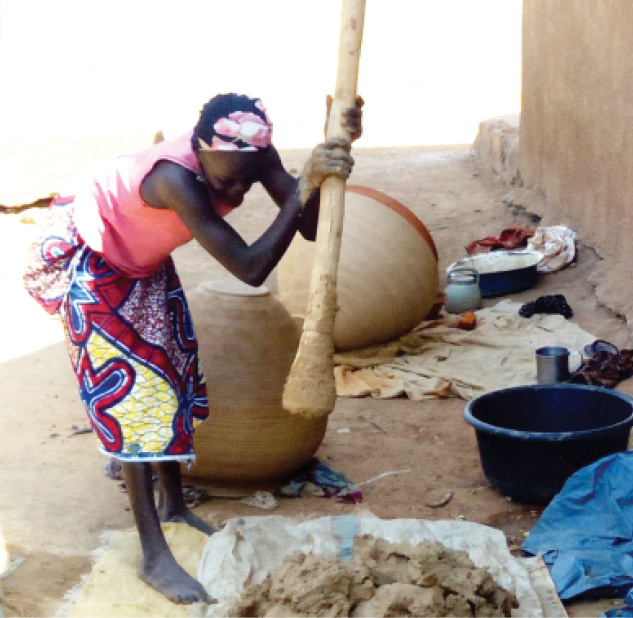An afternoon with pottery makers of Tatiko
Hannatu Saidu, 11, pounds the wet clay spread out on nylon sack in a deft up and down movement to soften it preparatory for the day’s work with pestle. It is a Saturday and the JSS1 student of the Government Day Secondary School Tatiko in Paikoro local government area of Niger State is on a […]

Hannatu Saidu at work
Hannatu Saidu, 11, pounds the wet clay spread out on nylon sack in a deft up and down movement to soften it preparatory for the day’s work with pestle. It is a Saturday and the JSS1 student of the Government Day Secondary School Tatiko in Paikoro local government area of Niger State is on a school break.
She then turned a mortar over, extricate part of the pounded clay on to its bottom and begun the kneading process from which she crafted a beautiful little pot to admiration of the visitors.
Tatiko community is synonymous with weaving and pottery works. While the male preoccupied themselves with weaving, pottery art is the exclusive preserve of the female folks.
Malam Ismaila Baba Aliyu, the community’s Crown Prince said like the weaving, the tradition was handed through generations and deeply rooted in their culture.
He explained that their forebears used earthen pots in the part of the country noted for its high temperature as a cooling system.
“If you take water from an earthen pot, you will not need a refrigerator”, he said, adding that with epileptic power supply across many communities, earthware provides the alternative to cooling.
According to him, the pots are formed into different sizes and designs according to the purpose they serve. There are of various types like cooking vessels, food bowls, storage pots, drinking cups, flower vessels and funerary urns amongst others.
North Central Chronicle ran into Halima Saidu, 25, putting final touches to some of her works, etching intricate design of different patterns on their surface.
Like most women in the community, the mother of three learned the art very early having been born into it. “It is hereditary and means of livelihood to every family in Tatiko”, she said.
According to her, the process involves accessing the main raw material which is clay through digging and moving same home. “We then pound, soaked it in water, separate foreign matter from it, kneading, shaping, decorating and firing”, she explained.
Isamaila Baba Aliyu said it was essential that the raw clay undergoes some process of purification as it contains a lot of impurities like sand, rocks and even vegetable matter which need to be removed.
“After the process the pure clay is then mixed with water to make it malleable, and then kneaded to remove the air bubbles before the actual molding commence”, he explained.
Halima said the intricate designs bring the inherent expertise of the artist out, adding that the pattern of decoration varies and that in some cases the designs show the location and ethnic group of an artist.
Halima said the prices of the pots vary according to size and design. “The little pot could be as low as N100 but the biggest size goes for N5,000”, she said.
She said they have ready markets for their products. “We take them to Paiko for sale on market day, while wholesalers come right here to purchase from Abuja, Kaduna and other places”, she said.
However, the deplorable condition of the only access road linking them to the outside world threatens the business. “Most times the products got broken while being conveyed to the markets,” she said.
The Crown Prince, Ismail also reechoes this challenge, saying the 10-kilometer road linking to the Paiko-Lapai highway has always been a nightmare especially during the rainy season.
Beyond the deplorable condition of the access road, getting the main raw material is strenuous and time consuming. “You have to dig out the clay using your strength and it is also time consuming”, Halima lamented.
She also said the works require a lot of woods to fire the end products, adding that they had to trek long distances to access same especially with forest fast disappearing due mostly to the activities of loggers and firewood sellers.
“We now depend on our husbands to help out with that part of the work”, she said.
Her husband, Malam Samsudden Saidu, 28, said he has to encourage the business by helping out with the firewood and other items used for firing the products.
“She is also assisting in taking off some burden off me through this craft. Sometimes I will be so broke and find it difficult to take care of the family’s basic needs and she always steps in without my asking”, he explained.
He said it would be wrong to leave their entire workload to her especially that some is very strenuous.
Aware of the economic and creative importance of the community, the Senator representing Niger East senatorial district, David Umaru in 2017 drew the federal government’s attention to the need to establish a weaving and pottery centre in the area.
The efforts led to commencement of works on the project tagged, “Proposed Gbagyi Traditional Cloth Weaving and Pottery Centre”, while the client is the National Council for Arts and Culture, Abuja”.
“We were happy that the federal government takes interest in our works by starting the project”, the Crown Prince said.
He appealed to both the state and federal government to consider the economic and tourism opportunities that are abound therein by fast tracking the construction of the art centre and upgrading infrastructure in the community.
However, as the community awaits the much anticipated interventions, it has to continue in its old strenuous ways of doing its own things.
